高考英语 动词的时态和语态精讲精练
- 格式:doc
- 大小:73.50 KB
- 文档页数:9
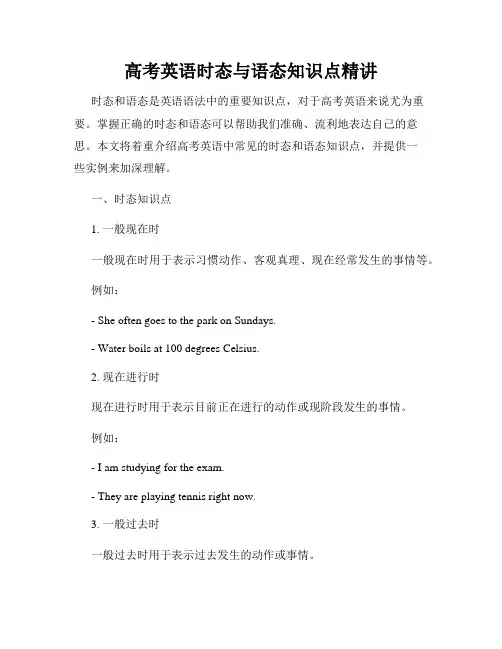
高考英语时态与语态知识点精讲时态和语态是英语语法中的重要知识点,对于高考英语来说尤为重要。
掌握正确的时态和语态可以帮助我们准确、流利地表达自己的意思。
本文将着重介绍高考英语中常见的时态和语态知识点,并提供一些实例来加深理解。
一、时态知识点1. 一般现在时一般现在时用于表示习惯动作、客观真理、现在经常发生的事情等。
例如:- She often goes to the park on Sundays.- Water boils at 100 degrees Celsius.2. 现在进行时现在进行时用于表示目前正在进行的动作或现阶段发生的事情。
例如:- I am studying for the exam.- They are playing tennis right now.3. 一般过去时一般过去时用于表示过去发生的动作或事情。
- She traveled to Europe last summer.- We lived in that house for ten years.4. 过去进行时过去进行时用于表示过去某一时刻正在进行的动作。
例如:- He was reading a book when I called him.- They were playing soccer at 6 o'clock yesterday evening.5. 现在完成时现在完成时用于表示过去发生的动作对现在造成的影响或结果。
例如:- I have finished my homework.- She has seen that movie before.6. 过去完成时过去完成时用于表示过去某一时间或动作发生之前已经完成的动作。
例如:- When I arrived, they had already left.- The train had departed when I got to the station.将来时用于表示将来某个时间要发生的动作或事件。

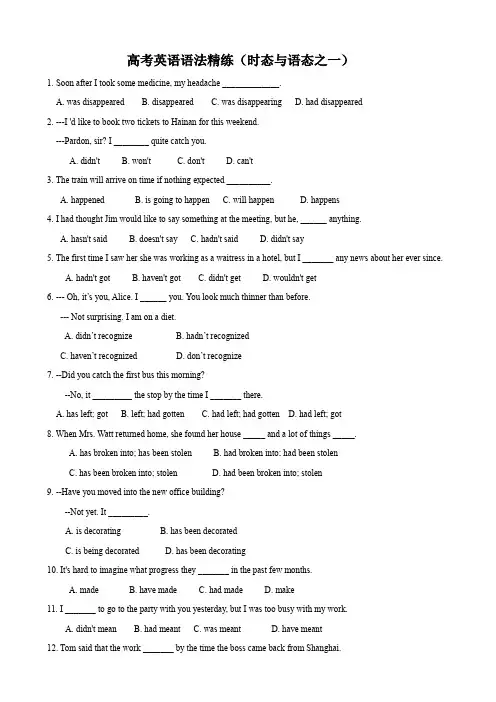
高考英语语法精练(时态与语态之一)1. Soon after I took some medicine, my headache _____________.A. was disappearedB. disappearedC. was disappearingD. had disappeared2. ---I 'd like to book two tickets to Hainan for this weekend.---Pardon, sir? I ________ quite catch you.A. didn'tB. won'tC. don'tD. can't3. The train will arrive on time if nothing expected __________.A. happenedB. is going to happenC. will happenD. happens4. I had thought Jim would like to say something at the meeting, but he, ______ anything.A. hasn't saidB. doesn't sayC. hadn't saidD. didn't say5. The first time I saw her she was working as a waitress in a hotel, but I _______ any news about her ever since.A. hadn't gotB. haven't gotC. didn't getD. wouldn't get6. --- Oh, it’s you, Alice. I ______ you. You look much thinner than before.--- Not surprising. I am on a diet.A. didn’t recognizeB. hadn’t recognizedC. haven’t recognizedD. don’t recog nize7. --Did you catch the first bus this morning?--No, it _________ the stop by the time I _______ there.A. has left; gotB. left; had gottenC. had left; had gottenD. had left; got8. When Mrs. Watt returned home, she found her house _____ and a lot of things _____.A. has broken into; has been stolenB. had broken into; had been stolenC. has been broken into; stolenD. had been broken into; stolen9. --Have you moved into the new office building?--Not yet. It _________.A. is decoratingB. has been decoratedC. is being decoratedD. has been decorating10. It's hard to imagine what progress they _______ in the past few months.A. madeB. have madeC. had madeD. make11. I _______ to go to the party with you yesterday, but I was too busy with my work.A. didn't meanB. had meantC. was meantD. have meant12. Tom said that the work _______ by the time the boss came back from Shanghai.A. had finishedB. had been finishedC. would finishD. has finished13. The tower ________ very old _______ the Ming dynasty.A. looks; dates back toB. which looks; dated back toC. that looks; dated fromD. looking; dates from14. Parents are afraid that their children's minds ______ with the violence they see on television.A. will polluteB. are pollutedC. have pollutedD. will be polluted15. This time tomorrow we _______ in the cinema and watching a film.A. are sittingB. will sitC. will be sittingD. should sit16. The official from an African country told the reporters that' it was the first time he _______ the Forbidden City.A. visitedB. has visitedC. would visitD. had visited17. Her hands _________ rough. She must have done a lot of heavy physical work.A. were feltB. are feltC. are feelingD. feel18. Living far away from my workplace, I ________ buying a car, but I haven't decided which type to buy.A. had consideredB. have been consideringC. have consideredD. would consider19. If you _____ the early bus, you will need to get up before five o'clock in the morning.A. will catchB. are to catchC. should catchD. are catchingMore help is needed in that area, because millions of people ________ to death now.A. will be starvedB. will starveC. are starvedD. are starving21. ---This is a terribly heavy box.---I _________ you to carry it.A. would helpB. helpC. will helpD. am to help22. The washing machines produced by our company sell well now, but a few years ago no one could have imagined the part in everyday life that they ________.A. were playingB. would playC. have playedD. play23. You'd better not phone my daughter between 7:00 and 8:00 tomorrow; she ______ her homework then.A. will doB. would doC. will be doingD. will have done24. Help others whenever you can and you ______ the world a nicer place to live in.A. will makeB. are makingC. have madeD. make25. I had hoped to see her off at the station, but I _____ too busy.A. wasB. had beenC. would beD. would have been26. Dear me! Just _____ at the time! I _____ no idea it was so late.A. look, haveB. looking, hadC. look, hadD. looking, have27. ---Hey, look where you are going!---Oh, I’m terribly sorry. _________.A. I’m not noticingB. I wasn’t noticingC. I haven’t noticedD. I don’t notice28. Mr Smith ______ a book about China last year but I don’t know whether he has finished it.A. has writtenB. wroteC. had writtenD. was writing29. He has changed a lot. He _______ not what he _______.A. is, isB. was, wasC. is, wasD. was, is30. He is very busy. I don’t know if he _____ or not tomorrow.A. comeB. comesC. will comeD. is coming31. The students ______ busily when Miss Brown went to get a book she _____ in the office.A. had written, leftB. were writing, has leftC. had written, had leftD. were writing, had left32. The telephone _____ three times in the last hour, and each time it _____ for my father.A. had rang; wasB. has rung; wasC. rang; has beenD. has been ringing; is33. ---Did you watch the basketball match yesterday?---Yes, I did. You know, my brother ________ in the match.(高考安徽卷)A. is playingB. was playingC. has playedD. had played34. So far this year we ______ a fall in house prices by between 5 and 10 percent.(高考福建卷)A. sawB. seeC. had seenD. have seen35. The telephone _______, but by the time I got indoors, it stopped. (高考四川卷)A. had rungB. was ringingC. ringsD. has rung高考英语语法精练(时态与语态之一)精练解析1. 【解析】答案为B。
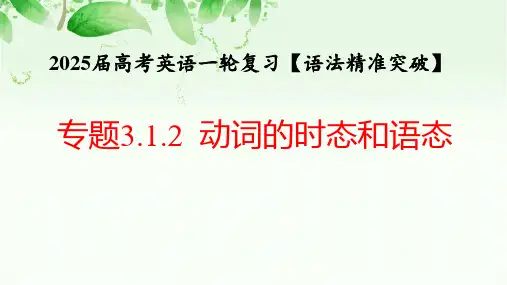
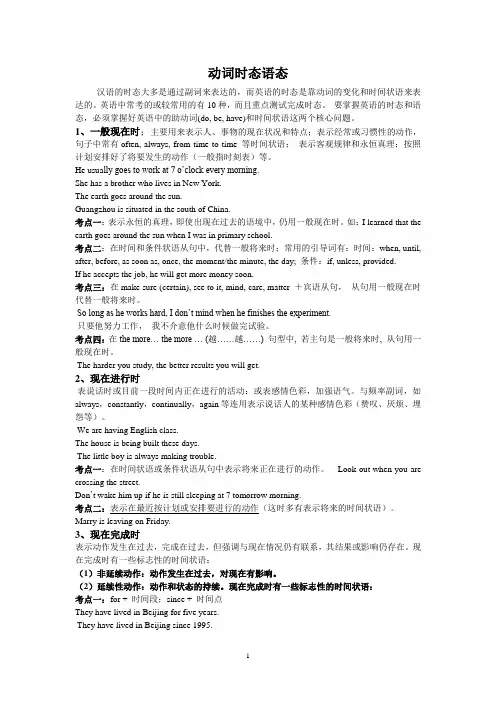
动词时态语态汉语的时态大多是通过副词来表达的,而英语的时态是靠动词的变化和时间状语来表达的。
英语中常考的或较常用的有10种,而且重点测试完成时态。
要掌握英语的时态和语态,必须掌握好英语中的助动词(do, be, have)和时间状语这两个核心问题。
1、一般现在时;主要用来表示人、事物的现在状况和特点;表示经常或习惯性的动作,句子中常有often, always, from time to time 等时间状语;表示客观规律和永恒真理;按照计划安排好了将要发生的动作(一般指时刻表)等。
He usua lly goes to work at 7 o’clock every morning.She has a brother who lives in New York.The earth goes around the sun.Guangzhou is situated in the south of China.考点一:表示永恒的真理,即使出现在过去的语境中,仍用一般现在时。
如:I learned that the earth goes around the sun when I was in primary school.考点二:在时间和条件状语从句中,代替一般将来时;常用的引导词有:时间:when, until, after, before, as soon as, once, the moment/the minute, the day; 条件:if, unless, provided.If he accepts the job, he will get more money soon.考点三:在make sure (certain), see to it, mind, care, matter +宾语从句,从句用一般现在时代替一般将来时。
So long as he works hard, I don’t mind when he finishes the experiment.只要他努力工作,我不介意他什么时候做完试验。
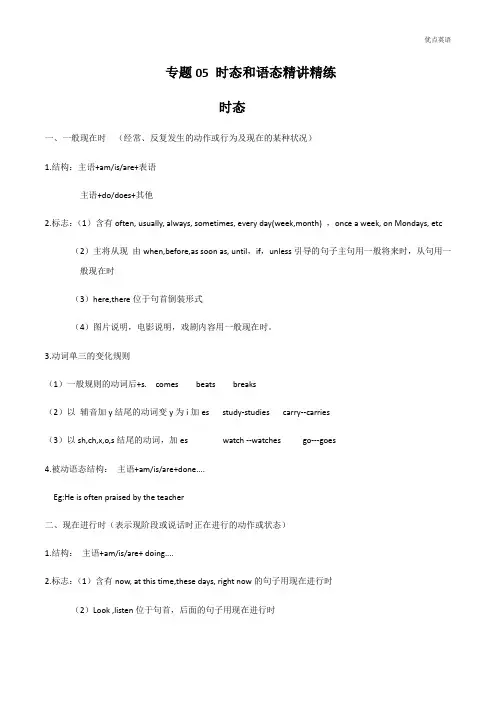
专题05 时态和语态精讲精练时态一、一般现在时(经常、反复发生的动作或行为及现在的某种状况)1.结构:主语+am/is/are+表语主语+do/does+其他2.标志:(1)含有often, usually, always, sometimes, every day(week,month) ,once a week, on Mondays, etc(2)主将从现由when,before,as soon as, until,if,unless引导的句子主句用一般将来时,从句用一般现在时(3)here,there位于句首倒装形式(4)图片说明,电影说明,戏剧内容用一般现在时。
3.动词单三的变化规则(1)一般规则的动词后+s. comes beats breaks(2)以辅音加y结尾的动词变y为i加es study-studies carry--carries(3)以sh,ch,x,o,s结尾的动词,加es watch --watches go---goes4.被动语态结构:主语+am/is/are+done....Eg:He is often praised by the teacher二、现在进行时(表示现阶段或说话时正在进行的动作或状态)1.结构:主语+am/is/are+ doing....2.标志:(1)含有now, at this time,these days, right now的句子用现在进行时(2)Look ,listen位于句首,后面的句子用现在进行时(3)表示位置移动的动词come leave go arrive begin start travel等用现在进行时表将来(4)根据上下文语境eg:The water supply has been cut off temporarily because the workers______(repair) the main pipes 根据句意:水供应暂时被切断因为工人们正在维修主管道,所以用现在进行时are repairing3.动词ing 形式的变化规则(1)一般规则的动词加ing talk---talking look--looking(2)以一个辅音字母结尾的重读闭音节,双写辅音字母加ing prefer--preferring cut--cutting(3)以不发音e结尾的动词去e 加ing come-coming hike---hiking4.现在进行时被动语态结构:主语+am/is/are being done....eg:The car is being repaired right now,so I can't lend it to you.三、一般过去时(过去某个时间里发生的动作或状态;过去习惯性、经常性的动作、行为。
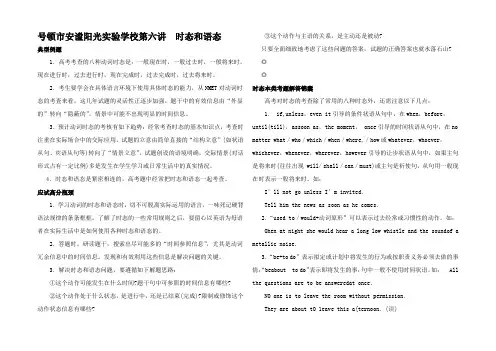
号顿市安谧阳光实验学校第六讲时态和语态典型例题1.高考考查的八种动词时态是:一般现在时,一般过去时,一般将来时,现在进行时,过去进行时,现在完成时,过去完成时,过去将来时。
2.考生要学会在具体语言环境下使用具体时态的能力,从NMET对动词时态的考查来看,这几年试题的灵活性正逐步加强。
题干中的有效信息由“外显的”转向“隐蔽的”,情景中可能不出现明显的时间信息。
3.预计动词时态的考核有如下趋势:经常考查时态的基本知识点,考查时注重在实际场合中的交际应用。
试题的立意由简单直接的“结构立意”(如状语从句、宾语从句等)转向了“情景立意”。
试题创设的语境明确,交际情景(对话形式占有一定比例)多是发生在学生学习或日常生活中的真实情况。
4.时态和语态是紧密相连的,高考题中经常把时态和语态一起考查。
应试高分瓶颈1.学习动词的时态和语态时,切不可脱离实际运用的语言,一味死记硬背语法规律的条条框框。
了解了时态的一些常用规则之后,要留心以英语为母语者在实际生活中是如何使用各种时态和语态的。
2.答题时,研读题干,搜索出尽可能多的“时间参照信息”,尤其是动词冗余信息中的时间信息。
发现和有效利用这些信息是解决问题的关键。
3.解决时态和语态问题,要遵循如下解题思路:①这个动作可能发生在什么时间?题干句中可参照的时间信息有哪些?②这个动作处于什么状态,是进行中,还是已结束(完成)?限制或修饰这个动作状态信息有哪些?③这个动作与主语的关系,是主动还是被动?只要全面细致地考虑了这些问题的答案,试题的正确答案也就水落石山?◎◎时态本类考题解答锦囊高考对时态的考查除了常用的八种时态外,还需注意以下几点:1. if,unless,even it引导的条件状语从句中,在when,before,until(till),assoon as,the moment, once引导的时间状语从句中,在no matter what/who/which/when/where,/how或whatever,whoever,whichever,whenever,wherever,however引导的让步状语从句中,如果主句是将来时(往往出现 will/ shall/can/must)或主句是祈使句,从句用一般现在时表示一般将来时。
动词的时态和语态精讲精练 1. —Have you known Dr. Jackson for a long time? —Yes, since she ______ the Chinese Society. A. has joined B. joins C. had joined D. joined 2. We first met on a train in 2000. We both felt immediately that we ______ each other for years. A. knew B. have known C. had known D. know 3. He _____ football regularly for many years when he was young. A. was playing B. played C. has played D. had played
4.. The way the guests ___ in the hotel influenced their evaluation of the service. A. treated B. were treated C. would treat D. would be treated 5.-Why does the Lake smell terrible? -Because large quantities of water . A. have polluted B. is being polluted C. has been polluted D. have been polluted 6. According to the literary review, Shakespeare his characters live through their language in his plays. A. will make B. had made C. was making D. makes 7.Would you please keep silent? The weather report _________and I want to listen. A. is broadcast B. is being broadcast C. has been broadcast D. had been broadcast 8. .— The food here is nice enough. — My friend ______ me a right place. A. introduces B. introduced C. had introduced D. was introducing 9.___ What is the price of petrol these days ___Oh, it ______ sharply since last month.
A. is raised B. has risen C. has arisen D. is increased 10.His sister left home in 1998, and ________since. A. had not been heard of B. has not been heard of C. had not heard of D. has not heard of Things haven’t changed very much since 从那时起情况并没有太大改变 His first book was a great success and he has been famous as a writer ever since She was hit by a car a month ago and has since been in the hospital The movie theter was closed two years since (since adv 在。。。以前)
11. Edward, you play so well. But I_______ you played the piano. A. didn’t know B. hadn’t known C. don’t know D. haven’t known 12,The number of foreign students attending Chinese universities ________ rising steadily since1990.
A. is B. are C. has been D. have been
13.I was out of town at the time, so I don’t know exactly how it _______. A. was happening B. happened C. happens D. has happened 1-5DC B B D 6-10 D B B B B 11-13 ACB
【专题突破】动词时态和语态做题技巧如下:
1. 根据题干中的时间标志词选择时态 动词时态须与句中时间状语一致。高考题常在题干中加入具体情景,以测试考生对动词时态知识的实际运用能力。因此敏锐捕捉时间标志词,并结合具体的语境,选择出正确的动词时态。 2. 根据主从句时态呼应的原则选择时态 近年来的高考试题一般不再单纯考查主从句的时态呼应,而是将其放在真实的并且符合实际的语境中进行考查,也会结合强调结构等其它语法现象进行考查。 考生在根据时态呼应原则解题时,要把握好以下几点: ①在时间、条件等状语从句中,用一般现在时态表示一般将来时态,一般过去时态表示过去将来时态,用现在完成时态表示将来完成时态。 ② 正确认定主句动词及从句动词两个动作发生的时间,并认真体会命题者所给出的语境。 ③ 解答宾语从句与主句时态呼应题时,考生应熟知以下规则: 如果主句动词为现在时态,则从句动词可根据需要使用任何时态,如果主句动词为过去时态,则从句动词须用合适的过去的某种时态(表示客观真理时使用一般现在时态)。 3. 根据具体的语言环境选择时态 近年来高考试题对时态考查的要求越来越高,大部分试题趋向情境化、实际化。考生要捕捉信息,理解情境,综合运用,灵活答题。 1.So far this year we ____ a fall in house prices by between 5 and 10 percent. A. saw B. see C. had seen D. have seen 2.Scientists think that the continents ______ always where they ______ today. A.aren’t; are B.aren’t; were C.weren’t; are D.weren’t; were 3.They ______ on the program for almost one week before I joined them, and now we _____ on it as no good results have come out so far. A.had been working; are still working B.had worked; were still working C.have worked; were still working D.have worked; are still working 4.The country life he was used to _______ greatly since 1992. A.change B.has changed C.changing D.have changed 5.With more forests being destroyed, huge quantities of good earth ______ each year. A.is washing away B.is being washed away C.are washing away D.are being washed away 6.--________David and Vicky ________married? --For about three years. A.How long were;being B.How long have;got C.How long have;been D.How long did;get 7.When the old man _______ to walk back to his house, the sun ______ itself behind the mountain. A.started; had already hidden B.had started; had already hidden C.had started; was hiding D.was starting; hid 8.If their marketing plans succeed, they ____ their sales by 20 percent. A. will increase B. have been increasing C. have increased D. would be increasing 9.As soon as he comes back, I’ll tell him when _______ and see him. A.you will come B.will you come C.you come D.do you come 10.I got caught in the rain and my suit____. A. has ruined B. had ruined C. has been ruined D. had been ruined 11. The hero’s story differently in the newspapers. A.was reported B.was reporting C.reports D.reported 12.Now that she is out of job, Lucy ______ going back to school, but she hasn’t decided yet. A.had considered B.has been considering C.considered D.is going to consider